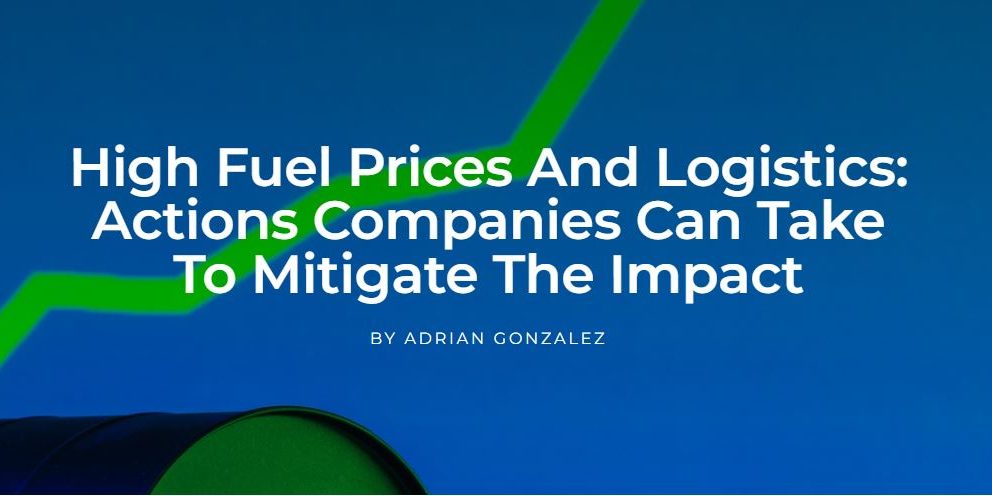As if transportation and logistics executives didn’t already have enough challenges to deal with, high fuel prices have been added to their plate. As reported in a recent CNBC article, “Diesel prices are contributing to inflationary headwinds due to the fuel’s vital role in the American and global economy. Tankers, trains, and trucks all run on diesel. The fuel is also used across industries including farming, manufacturing, metals and mining.”
So, are high fuel prices a short-term problem or a lingering one? Is this a problem just for transportation professionals, or does it impact other functional groups as well? And most importantly, what actions can companies take to mitigate the impact? Those are the main questions I discussed with Chris Jones, Executive Vice President, Industry and Services at Descartes, in a recent episode of Talking Logistics.
High Fuel Costs: Temporary or Long-Term?
I began our discussion with the most important question for most people: Are the current high prices for diesel a temporary problem or will this persist long term? Chris responds that although fuel prices are cyclical and will eventually go down, “Anybody who thinks they will wait this one out is probably going to be in a lot of pain.”
Chris points out that oil is a global market. The U.S. is only one of the several major players in this market. That became obvious when Russia invaded Ukraine and the subsequent sanctions were imposed. Although Russia accounts for only about 10% of oil production, the impacts have been felt worldwide.
“For example, some East coast refineries were using Russian crude to produce diesel,” says Chris. “It’s not that simple to change over to using U.S. crude. As a result, it’s common to see diesel at over $6/gallon.”
Chris also mentions that the economy is doing well, so demand is high, and there is competition for oil from many other industries. “So, the next couple of years, at least, we will continue to see high prices for fuel [compared to 2021 and earlier].”
How Companies Can Respond
In a May 2022 survey on this topic with our Indago supply chain research community, surprisingly no companies said they had made “a lot of changes” to their transportation practices to deal with this problem, while the largest response (42%) was from companies who said they had made “no changes.”
This did not surprise Chris, but he offered some suggestions for how companies can respond to this challenge, starting with internal collaboration. He explains that other departments besides transportation, such as sales, procurement and customer service, can have a major impact on transportation requirements.
“The CFO can be your friend on this,” Chris says. If you’re proposing some action from a service policy point of view, you need somebody to quantify what it’s worth, “and the ultimate scorekeeper is the finance team, so they’re key in this conversation too.”
Other “low-hanging fruit” actions Chris mentions include looking at customer contracts to see if they allow for fuel surcharges. Or collaborating with customers on changes to services levels such as going from same-day or next-day deliveries to two-day deliveries.
Another area to look at is your TMS configuration. For example, when fuel was cheaper, you may have allowed more miles in order to accommodate expensive labor resources. That may have flipped.
You can also look at driver performance. Are they speeding, idling too long, going off route? These things impact fuel usage. Vehicle performance can, as well. When do they need a tune-up? Telematics can help you understand both of these issues.
Also, challenge carrier fuel surcharges. Question whether these charges are accurate.
Chris says the most important factor is collaboration — internally, as well as with customers and carriers. “Put some time and effort into it and you will see benefits.”
Beyond the Low-Hanging Fruit
I next asked Chris, given the potential for elevated fuel prices to be a longer-term problem, what additional things companies can do to mitigate the impact and perhaps even create a competitive advantage.
Chris had many great suggestions around various types of optimization, planning and collaboration, as well as some ideas around sustainability. For all of his insights and advice, I recommend that you watch the full episode. Then keep the conversation going by posting a comment and sharing your own ideas and perspectives on this topic.
Source: https://talkinglogistics.com/2022/07/25/high-fuel-prices-and-logistics-actions-companies-can-take-to-mitigate-the-impact/















